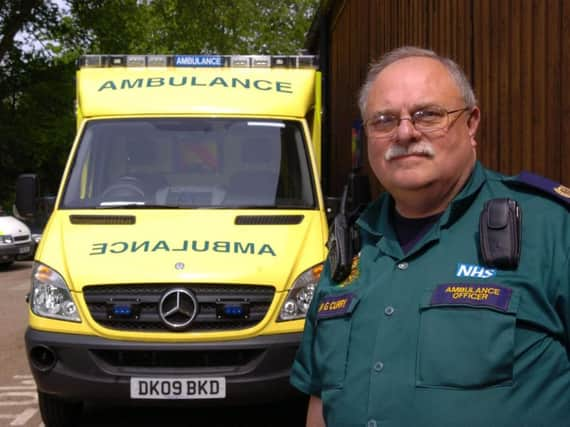Ambulance hero helped transform 999 service


But any thoughts of taking a break were shattered as they drove down Livingstone Road, Blackpool.
A screaming woman ran towards the emergency crew as smoke poured out of a nearby flat window.
Advertisement
Hide AdAdvertisement
Hide AdAnd, in one of the dramatic moments of Graham Curry’s 42 years as a paramedic, he jumped out of the ambulance and plunged into a smoke-filled stairway.
Within seconds the distraught mother had told him her baby was trapped in the flat.
Graham, who this week begins his retirement, said: “I didn’t think. I ran up the stairs and came to the door, but I didn’t know anything about backdrafts.
“I kicked the door in and immediately was knocked flying as all the oxygen left the flat.
Advertisement
Hide AdAdvertisement
Hide Ad“I got up, grabbed the baby and tucked it under my tunic and ran down the stairs about 20 at a time.”
Graham, 63, had to be treated in hospital following the rescue and received a ticking off for putting his life at risk from his bosses.
However, he received a bravery award for the incident in 1981.
Graham joined the ambulance service as a 19-year-old, working at first in Teesside before moving to Blackpool two years later.
Advertisement
Hide AdAdvertisement
Hide AdHe said: “I am from the south originally, but I had family in Blackpool and thought it would be an interesting place to work.”
During his career he has seen changes which have completely altered the roles carried out by ambulance staff.
Since the 1980s ambulance staff have operated as paramedics, able to deliver life-saving treatment at the scene of accidents or medical emergencies.
Today, it is not uncommon for paramedics to study for another two years to become doctors, such is the extent of their degree based training.
Advertisement
Hide AdAdvertisement
Hide AdWith more emergency treatments and drugs available, paramedics are able to save more lives than at any time before.
And Graham was instrumental in introducing technological advances which put the Fylde ambulance service at the forefront of innovation.
Working in the IT department, Tony used mobile phone technology in the late 90s to allow hospital doctors to see live footage of the treatment being administered by paramedics.
He said: “We called it telemedicine. We had to use analogue signals, because there was no digital equipment available. The ambulance crew had cameras, there were cameras inside the vehicle and outside.
Advertisement
Hide AdAdvertisement
Hide Ad“We were able to relay live pictures to the hospital. Doctors were able to monitor the treatment and ask for certain procedures to be carried out.”
It wasn’t Graham’s first pioneering use of technology.
In 1990 he adapted tracking equipment used by security vans to allow ambulances to find the fastest way to hospitals.
“It was like a primitive GPS but used tracking stations around the county, rather than satellite technology.”
Graham has seen countless changes in his career but one of the greatest has been the installation of defibrillators in ambulances.
He said: “That made a huge different to us.
Advertisement
Hide AdAdvertisement
Hide Ad“We were able to save so many more people and, with the increased training, we were given far more respect.
“It used to really annoy us when people would refer to us as ambulance drivers, as if all we did was ferry people to hospital, when the job entailed so much more than that.”
One change which is not for the best is the increasing number of people use the 999 service for non-emergencies.
He said: “People seem to ring 999 more than they would have done in the past.
Advertisement
Hide AdAdvertisement
Hide Ad“Whether that is down to not being able to get GP appointments, I am not sure.
“They seem to have the idea that they will be taken to A&E, even if there is nothing wrong with them that requires emergency treatment and become angry when we refuse.
“Their behaviour is putting the ambulance service under a lot of stress.”
Graham, who retired as section manager, in charge of the whole of West Lancashire, plans to do more voluntary work during his retirement alongside his regular work as a magistrate.